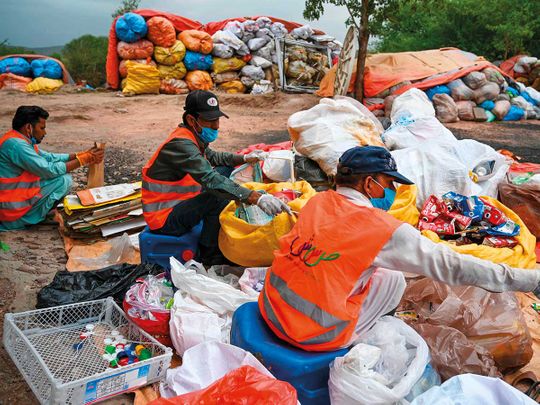
Islamabad: Pakistan’s Ministry of Climate Change has seized nearly 2.5 million polythene bags over the last week as part of the crackdown against use of plastic bags in the capital city.
Plastic bags have been banned in Islamabad since August 14 as part of Prime Minister Imran Khan’s ‘Clean Green Pakistan’ campaign. Manufacturing, sale and distribution of plastic bags is now illegal in Islamabad. The special teams are visiting different areas of the city almost daily to ensure the implementation of ban as non-violators are being heavily fined.
After the new ban, producers of plastic bags may be fines up to Rs500,000 (Dh11,722) whereas sellers could face fines up to Rs50,000 and buyers and public seen using bags at shops could be fined up to Rs5,000, according to Deputy Commission Islamabad Hamza Shafqaat.
“In the first phase of the campaign, the focus and ban is only on single-use carrier plastic bags to create mass awareness” clarified DC Islamabad. Nearly 50 per cent of the shopkeepers in Islamabad have welcomed the ban but the administration is also facing resistance at some places.
On August 20, Islamabad’s popular eatery, Savour Foods, was sealed and handed a fine of Rs200,000 for violating the ban and shoving inspectors. The incident signifies the challenges of the newly introduced single-use plastic bag ban in the absence of easily-available alternatives.
The basic purpose behind the fines is to change behaviours, says Pakistan’s Minister of State for Climate Change, Zartaj Gul, who is spearheading a broader countrywide anti-plastic campaign. “The major focus is on awareness to change public behaviour towards a environment-friendly society,” she said.
The new ban follows a three-month-long campaign to raise awareness about the environmental hazards of plastic bags that block drainage systems, pollute water streams and canals, kill wildlife and cause other environmental and health problems.
Along side the regular checks on shops, the city administration is also holding awareness seminars and distributing free cloth bags to encourage the use of cotton bags among citizens.
Pakistan uses 55 billion plastic bags every year and the overall plastic use has been growing by 15 per cent each year which has been termed detrimental by environmental experts in the absence of proper waste management and recycling process. Pakistan Environmental Protection Agency Director General Farzana Altaf has said the ministry that in the initial phase action will be taken against wholesalers to cut off the supply of plastic bags.
Tassadaq Malik, an Islamabad-based environmentalist who has been involved in anti-littering activities for many years, appreciated the ban. Talking to Gulf News, Tassadaq says that “the availability of alternative bags in Islamabad markets has created some awareness about the hazards of plastic pollution but the campaign has to be more efficient and consistent. We have seen actions [by the government] and reaction [by the people] so far but the ban should be strictly followed to make Pakistan plastic free.” To play his part towards clean and green Pakistan, Tassadaq in his personal capacity has personally designed and placed 10 eco-friendly canvas bags at a cost of about Rs13000 (AED 300) at Islamabad zoo to prevent littering.












